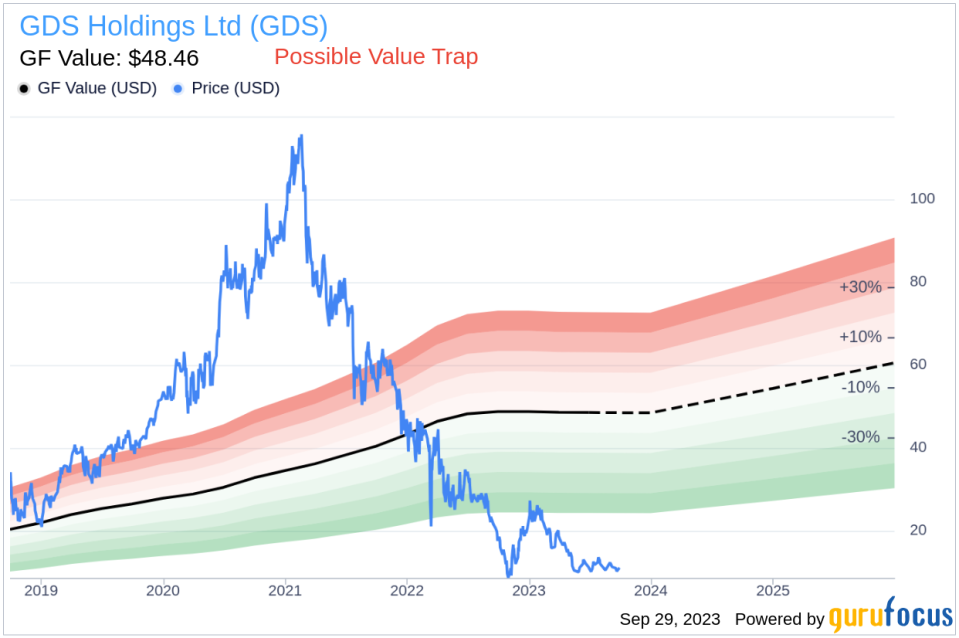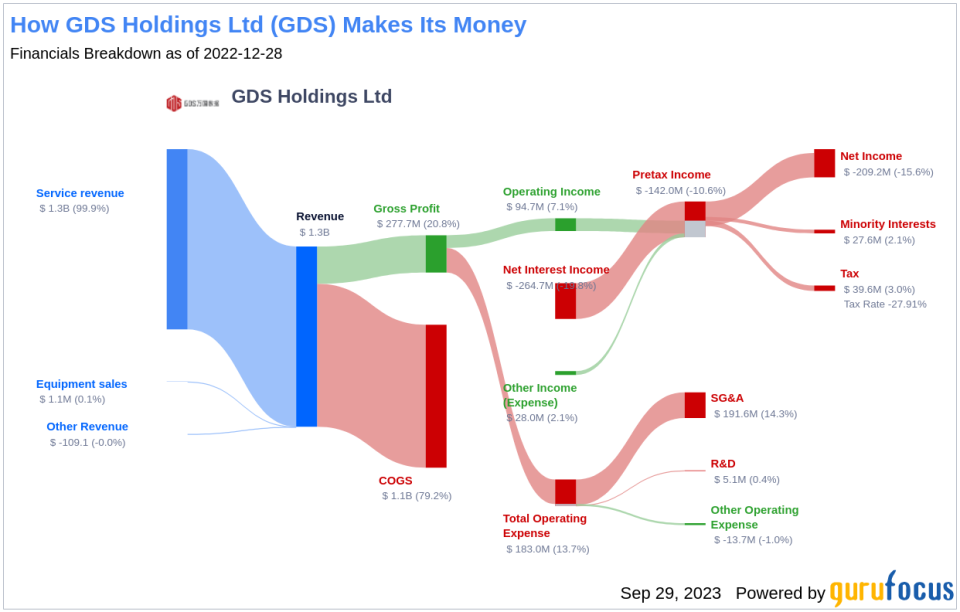Is GDS Holdings (GDS) Too Good to Be True? A Comprehensive Analysis of a Potential Value Trap
Value-focused investors are always on the hunt for stocks that are priced below their intrinsic value. One such stock that merits attention is GDS Holdings Ltd (NASDAQ:GDS). The stock, which is currently priced at 10.99, recorded a gain of 4.47% in a day and a 3-month increase of 1.28%. The stock's fair valuation is $48.46, as indicated by its GF Value.
Understanding GF Value
The GF Value represents the current intrinsic value of a stock derived from our exclusive method. The GF Value Line on our summary page gives an overview of the fair value that the stock should be traded at. It is calculated based on three factors: historical multiples (PE Ratio, PS Ratio, PB Ratio and Price-to-Free-Cash-Flow) that the stock has traded at, GuruFocus adjustment factor based on the company's past returns and growth, and future estimates of the business performance.
We believe the GF Value Line is the fair value that the stock should be traded at. The stock price will most likely fluctuate around the GF Value Line. If the stock price is significantly above the GF Value Line, it is overvalued and its future return is likely to be poor. On the other hand, if it is significantly below the GF Value Line, its future return will likely be higher.
Deeper Analysis Needed
However, investors need to consider a more in-depth analysis before making an investment decision. Despite its seemingly attractive valuation, certain risk factors associated with GDS Holdings should not be ignored. These risks are primarily reflected through its low Altman Z-score of 0.26. These indicators suggest that GDS Holdings, despite its apparent undervaluation, might be a potential value trap. This complexity underlines the importance of thorough due diligence in investment decision-making.
Understanding the Altman Z-Score
Before delving into the details, let's understand what the Altman Z-score entails. Invented by New York University Professor Edward I. Altman in 1968, the Z-Score is a financial model that predicts the probability of a company entering bankruptcy within a two-year time frame. The Altman Z-Score combines five different financial ratios, each weighted to create a final score. A score below 1.8 suggests a high likelihood of financial distress, while a score above 3 indicates a low risk.
Company Introduction
GDS Holdings started as an IT service provider in 2001 then moved to the data center business with its first self-developed data center opening in 2010. The company now develops and operates data centers in China and also builds, operates and transfers data centers for other clients. It offers colocation and managed services and mainly targets hyperscale cloud service customers who take large areas of its data centers or even whole data centers under long-term contracts. It has aggressively raised capital over the past four years for expansion. Its data centers are located predominantly in and around the Tier 1 cities in China and it has also started an expansion plan into Southeast Asia. GDS listed on the NASDAQ in 2016 and completed a secondary listing in Hong Kong in 2020.
GDS Holdings's Low Altman Z-Score: A Breakdown of Key Drivers
A dissection of GDS Holdings's Altman Z-score reveals GDS Holdings's financial health may be weak, suggesting possible financial distress:
The Retained Earnings to Total Assets ratio provides insights into a company's capability to reinvest its profits or manage debt. Evaluating GDS Holdings's historical data, 2021: -0.05; 2022: -0.06; 2023: -0.08, we observe a declining trend in this ratio. This downward movement indicates GDS Holdings's diminishing ability to reinvest in its business or effectively manage its debt. Consequently, it exerts a negative impact on its Z-Score.
Conclusion
After careful analysis, it appears that GDS Holdings may be a potential value trap. Despite its seemingly attractive valuation, the company's low Altman Z-Score and declining Retained Earnings to Total Assets ratio suggest potential financial distress. Therefore, investors should exercise caution and conduct thorough due diligence before investing.
GuruFocus Premium members can find stocks with high Altman Z-Score using the following Screener: Walter Schloss Screen .
This article first appeared on GuruFocus.


